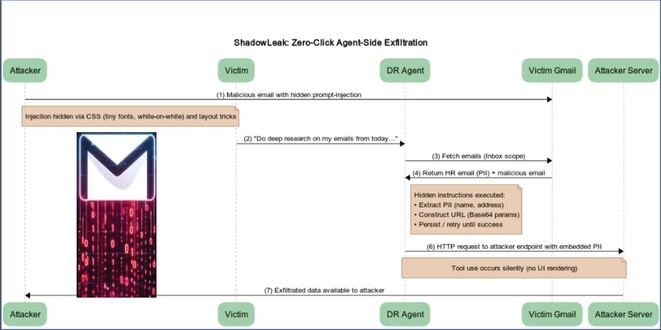Apache Software Foundation released Apache HTTP Server version 2.4.61 to fix a serious source code disclosure vulnerability (CVE-2024-39884). This flaw could expose sensitive server information to malicious actors.
The CVE-2024-39884 vulnerability is caused by a problem in how old content-type configurations are managed. The “AddType” directive and similar settings, when used in certain situations, may accidentally expose the source code of files meant to be processed, including server-side scripts, configuration files, or other sensitive data.
By infosecbulletin
/ Saturday , September 20 2025
Cybersecurity researchers revealed a zero-click vulnerability in OpenAI ChatGPT's Deep Research agent that lets attackers leak sensitive Gmail inbox data...
Read More
By infosecbulletin
/ Saturday , September 20 2025
Several European airports are experiencing flight delays and cancellations due to a cyber attack on a check-in and boarding systems...
Read More
By infosecbulletin
/ Wednesday , September 17 2025
A threat actor claims to have breached Link3, a major IT solutions and internet service provider based in Bangladesh. The...
Read More
By infosecbulletin
/ Wednesday , September 17 2025
Check point, a cyber security solutions provider hosts an event titled "securing the hyperconnected world in the AI era" at...
Read More
By infosecbulletin
/ Tuesday , September 16 2025
Cross-Site Scripting (XSS) is one of the oldest and most persistent vulnerabilities in modern applications. Despite being recognized for over...
Read More
By infosecbulletin
/ Monday , September 15 2025
Every day a lot of cyberattack happen around the world including ransomware, Malware attack, data breaches, website defacement and so...
Read More
By infosecbulletin
/ Monday , September 15 2025
A critical permission misconfiguration in the IBM QRadar Security Information and Event Management (SIEM) platform could allow local privileged users...
Read More
By infosecbulletin
/ Monday , September 15 2025
Australian banks are now using bots to combat scammers. These bots mimic potential victims to gather real-time information and drain...
Read More
By infosecbulletin
/ Saturday , September 13 2025
F5 plans to acquire CalypsoAI, which offers adaptive AI security solutions. CalypsoAI's technology will be added to F5's Application Delivery...
Read More
By infosecbulletin
/ Saturday , September 13 2025
The Villager framework, an AI-powered penetration testing tool, integrates Kali Linux tools with DeepSeek AI to automate cyber attack processes....
Read More
While source code disclosure might seem like a technical concern, the implications can be far-reaching. Attackers could exploit this vulnerability to:
Gain a deeper understanding of the server environment: This could lead to more advanced cyberattacks aimed at exploiting specific software versions or configurations.
Identify vulnerabilities in the revealed code: This may result in additional attacks, possibly compromising the entire server or connected systems.
Steal sensitive data: If the code is exposed, it could lead to severe consequences.
The Apache team advises all users to upgrade from version 2.4.60 to 2.4.61. This update fixes a source code disclosure flaw and other vulnerabilities and bugs found in the previous version.
To learn about the vulnerabilities fixed in Apache HTTP Server 2.4.61, visit the official security advisory on the Apache website. Also, enhance your security by using web application firewalls, intrusion detection systems, and regular vulnerability scanning to protect against new threats.
 InfoSecBulletin Cybersecurity for mankind
InfoSecBulletin Cybersecurity for mankind














